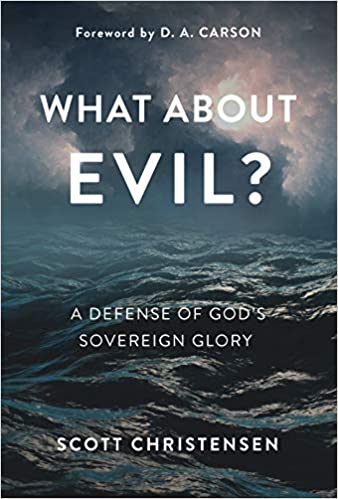A Brief Book Summary from Books At a Glance
By Steve West
Introduction
In this book Christensen proposes a theodicy that is grounded in biblical and theological exposition rather than abstract philosophy. He argues that what justifies God in the light of evil’s existence is that God sovereignly plans everything in the universe for the maximization of his own glory. The greatest display of the glory of God occurs in the incarnation, atonement, and resurrection, but redemption logically necessitates the fall into sin which produces evil and suffering. The greater the evil and suffering, the greater the backdrop of darkness against which the light of God’s glory shines, and the greater the relief and rejoicing at the vanquishing of evil by the work of Jesus Christ. The greatest good is the glory of God.
Table of Contents
Foreword by D. A. Carson
- Introduction: The Problem of Evil
- Theodicy and the Crisis of Our Secular Age
- Probing the Darkness
- Justifying the Ways of God
- Guarding the Sacred Treasure of Free Will
- Working for the Greater Good
- The Transcendent Author of History
- Walking through the Bible’s Dark Forest
- The Challenge of Moral Responsibility
- Everybody Loves a Good Ending
- The One True Story
- The Fortunate Fall and God’s Greatest Glory
- God’s Redemptive Glory in Scripture
- The Peerless Redeemer
- The Suffering Redeemer
- The Cosmic Redeemer
- The Grace-and-Glory Effect
Appendix: Sullied by Supralapsarianism?
Summary
Chapter 1: Introduction: The Problem of Evil
There are countless examples of tragedy, suffering, and evil in the world. Although we can often blame human beings, we also wonder where God is and why he doesn’t intervene. Theodicy is the attempt to justify a good and sovereign God in light of the evil in the world. Often a philosophical dilemma is set up to preclude God being both all-good and all-powerful, yet those attributes are part of the classical Christian conception of God. Many insist that the existence of evil impugns God’s justice and character. Too many Christians have failed to present a biblical view of God, with the result that when evil occurs people are not prepared for it. Throughout history numerous theodicies have been offered. The most common one is the Free-Will Defense, but there is also the Natural-Law Defense, the Greater-Good Theodicy, the Soul-Making Theodicy, the Best-of-All-Possible-Worlds Defense, and the Divine-Judgment Defense. The theodicy proposed here is the Greater-Glory Theodicy.
This model states that God’s ultimate purpose is for his glory and his glory is most highly revealed through Christ’s atonement. Christ’s redemptive work wouldn’t have been necessary without the fall into sin, so the fall is necessary for God’s purposes. This type of position in history has been referred to as felix culpa (i.e. “fortunate fall”). The fall was planned by God so he could bring about redemption. Every great story is about redemption and overcoming catastrophe. We do not expect the hero to defeat the villain by dying, but that’s what Christ does. God’s power and glory is displayed in weakness as well as in power.
Chapter 2: Theodicy and the Crisis of Our Secular Age
When the tremendous Lisbon earthquake occurred in 1755 the shock and devastation were enormous. All over Europe people asked questions about God’s role in the disaster. We need to understand the trajectory of thought in the West since the Enlightenment if we are to understand contemporary discussions about God and the existence of evil. The Enlightenment put human freedom in the highest place and it radically affected how every subject was thought about.
[To continue reading this summary, please see below....]The remainder of this article is premium content. Become a member to continue reading.
Already have an account? Sign In
Buy the books

WHAT ABOUT EVIL? A DEFENSE OF GOD'S SOVEREIGN GLORY, by Scott Christensen